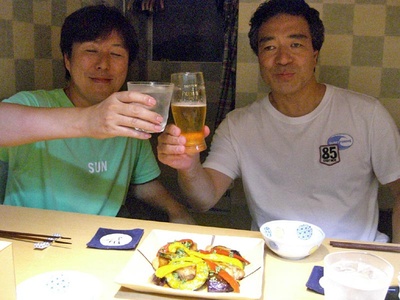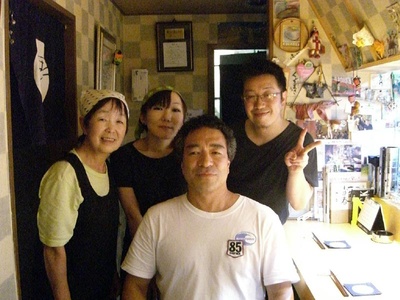It had been about three years and I was really itching to get back to Japan this past summer.
I figured that having taken all of those teacher courses over the past three years and going through all of the excruciating things that one does to get resettled after living abroad for so long, that we deserved this journey back to Japan. With the recession, tickets were actually pretty cheap. It was a necessary trip back to see old friends and family.
There are few places on the planet that I now feel that I need to see. I have done enough travelling and have seen enough to satisfy my wanderlust for the time being. Nowadays, I travel mostly to reconnect with friends, family and students. On this visit we had no plans to travel around Japan to see any particular sites or even to get down to Kansai where good friends, Tak Matsuba, Gen Hamada and Tom Mizuguchi, live. At about 80 yen to the Canadian dollar the budget was tight.
This was a journey to get reconnected with the Japan I know. I had been missing the places, people and the taste of the food profoundly. Oh, how we were yearning for a good bowl of ramen, manju from our favourite shop, fresh sashimi, Sendai’s famous barbecued beef tongue or sasakamaboko. Having to put up with mediocre Canadian ‘Japanese’ food for three years was becoming more and more irksome.
Sendai, the city in Tohoku region where I lived, worked and grew for eight years (1995 to 2003), has under gone a tremendous transformation since I was there last in 2006. Many buildings are now gone. Several new towering condominiums now dominate the downtown core, close to Sendai train station. The tallest is the imposing Mori Building (same company that built “Roppongi Hills” development in Tokyo) which was still under construction. Most condos start at about $300,000 CDN for a one-bedroom unit. The “Apa” condominium even pipes onsen (hot spring) water into its units.
The Rakuten Eagles professional baseball team is still floundering, the drinking/ entertainment district is a lot more quiet than it was before the recession (a bartender friend at “Mon” told me that business is down 50 per cent from the same time last year), there are more “Sale” signs in store windows and, I am beginning to see more non-Japanese faces working in service jobs from the south-east Asian lady I saw working at the McDonalds at Shinagawa, an Indian fellow at the Lawsons convenient store in Narita, the African lady working at the Customer Service desk at the Sendai Kokusai Hotel or the young, blond woman working the counter at the Doutor Coffee Shop in the Nagamachi Mall. There is even a new Light Rail train to Sendai International airport with signs in Japanese, Chinese, Korean and English. These are some early signs of the cultural transformation that is certainly occurring in Japan.
My Canadian pal, Lorne Spry, 62, has always exemplified the ex-pat’s agonizing dilemma for me. He is now been seriously wavering between coming back to B.C. or staying in Japan “for good”. He and wife Mari, 47, have been battling with this decision because son Shou, 12, will be entering high school shortly and he is struggling with math and science. Mari is convinced that the family would be better off in Canada where she has the impression that Shou would do better academically, even though he speaks surprisingly little English. My talks with Lorne on this subject were compelling and painful.
Another story that I plan to write will be about my wife Akiko’s family. We were very fortunate to have had the opportunity to stay with her aunt, Dr. Hiroko Nagaike, 86, the first women’s doctor in Sendai. She opened up her clinic in 1951. Despite my rudimentary Japanese, we managed to conduct a fascinating interview over the course of the month that we were staying with her. I rarely have the opportunity to meet more gracious or intelligent people than Nagaike sensei whose son, Dr. Fumiyasu Nagaike, now the head doctor and president of the clinic, recently delivered the babies of two friends.
Other friends are doing well too. My hair salon owner friend Senji Kurosu is doing well, although he too says that business has been down since the recession. His daughter Hikari has turned three. Wife Atsuko is still working at Sendai International Airport. His mother still helps out in the salon too. My friend Kenji Suzuki seems well too. He’s moved into public housing where he pays about 10,000 yen a month rent and operates a nebulous ‘recycling business’. He seems more affected by middle age than the rest of us. He never settled into any sort of ‘career’ and has become an outsider even amongst his few friends.
My Sendai and Tokyo aikido pals are all doing well too. I’m glad to report that the Keijutsukai dojo in Shinagawa, Tokyo, is doing fine after the passing of Makiyama sensei and Canadian Nisei Lloyd Kumagai. Noriko Takahashi and the rest of the senior students there are doing a splendid job of keeping the Makiyama sensei’s spirit of humour and serious budoh, alive. That visit on a hot, sultry August morning before Obon (and the cold beer afterwards) made a deep impression too.
I also interview Nyogen and Ewa Nowak, the Polish Zen priest and his wife who have been living in Sendai for more than 20 years. Nyogen-san is writing a book in Japanese about the legendary swordsman and artist, Miyamoto Musashi. I spent two splendid afternoons in the Mukaiyama retreat of this wonderful artist couple who are beginning to exhibit more of their work internationally. Nyogen-san had many very interesting insights into Musashi, which I will share in a later article.
Finally, as a special treat for readers, I went to Ebisu, Tokyo, to interview the very popular American enka singer, Jero, 27, who I wrote about earlier. We had a very frank, in depth discussion about what it is like to be a young African American Nikkei singer, what his expectations for his career are and feelings about embarking on his first Japanese concert tour.
As with any meaningful journey, this one was transformative: broadening my perspective of the world and self. Stay tuned.
*Norm always welcomes your comments at masaji777@gmail.com
** This article was originally published in Nikkei Voice (Toronto).
© 2009 Norm Ibuki







